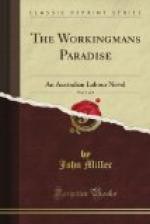Tremblingly, shaken with anguish, he saw himself—unfit to look into the eyes of a woman such as this. Like loathsome images of a drunkard’s nightmare scenes that were past came to him. Upon his lips were kisses that stung and festered, around his neck were the impress of arms that dragged him down, into his eyes stared other eyes taunting him with the evil glances that once seemed so dear. What had he of manhood to offer to this pure woman. It seemed to him a blasphemy even to stand there by her. His passion fled. He only felt a pitiful, gnawing, hopeless, indescribable longing.
What he had been! How he had drunk and drunk and drunk again of the filthy pools wherewith we civilised peoples still our yearnings for the crystal spring of Love, that the dragon of Social Injustice guards from us so well! His sins rose in front of him. They were sins now as they had never been before. The monogamy of his race triumphed in him. For men and for women alike he knew there was the same right and the same wrong.
His soul abhorred itself because of his unfitness to match with this ideal woman of his people. He could feel her purity, as he stood there by her. He could feel that her lips still waited for the lover of her life, that round her waist the virgin zone still lay untied, that she could still give herself with all the strength of unsullied purity and unweakened passion. And he, who had thought in his miserable folly that at least he was as much Man as she was Woman? He could only give her the fragments of a life, the battered fragments of what once had been well worth the having.
He knew that now. He saw himself naked and he knew what he was and what he had been. He had feared comparison with her intellectually and he towered above her, even now; he knew it. He knew now that to him it had been given to sway the thoughts of men, to feel the pulse of the great world beat, to weld discontent into action, to have an idea and to dare and to give to others faith and hope. That came to him also, without conceit, without egotism—with a rush of still more bitter infinitely more unbearable, pain. For this, too, he had wasted, flung away, so it seemed to him in his agony of degradation: because he had not been true to his higher self, because he had not done as a true Man would. And so, he had been blind. He saw it plainly, now, the path he should have trod, trampling his weaknesses down, bending his whole life in one strong effort, living only for the work at hand. And to him it came that, perchance, on him was this great punishment that because of his unworthiness the Cause must wait longer and struggle more; that because he had not been strong little children would sob who might have laughed and men would long for death who might have joyed in living. And he knew, too, that had he but been what he might have been he would have stood fearlessly by her side at last and won her to cast in her lot with his. For there was a way out,




